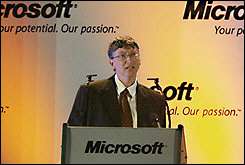India most interesting, but U.S. No. 1 -- Gates

Bill Gates may have beaten his peers in pumping in $1.7 billion of investments and announcing a bigger hiring plan in India because he finds the country "interesting," but the Unites States is still the No. 1 market for the Microsoft chairman.
"The United States continues to be a very key country (in terms of software sales) considering the number of start-ups, the willingness to take risks, and the number of consumers there (are in the country)," said Gates in an informal tête-à-tête with select Indian CEOs and businessmen yesterday.
Gates had been visiting India on a four-day trip that ended today.
"But after the U.S., India is the second most interesting country simply because of the breath of engineering skills, the global reputation that has developed here, and its vibrant software vendor industry."
Gates announced the day before that Microsoft will invest $1.7 billion and hire an additional 3,000 people in India over the next four years, making it the latest global IT giant to commit more than $1 billion in India to cash in on the country's burgeoning economy and talent for their own growth.
The other global information-technology giants that have announced mega investments in India's IT sector in the last two months are Cisco ($1 billion), Intel ($1.1 billion), AMD-Semindia Consortium (up to $3 billion along with other investors) and Vodafone ($1.5 billion).
According to Gates, even though the percentage of revenues that Microsoft gets from the United States will go down over a period of time, America is still the top growth market "in absolute terms."
"The United States that represents 1 percent of the world's population gives Microsoft 40 percent of its revenues. Likewise, countries like Sweden, Switzerland, contribute an amazing amount of revenue," said Gates adding that what Microsoft spends in India is dramatically higher than what the company gets out of the country in terms of revenues.
So, where does India fit into Microsoft's grid? After all, the additional hiring that Gates announced will ramp up Microsoft's India headcount to 7,000 over the next four years, making the company's hiring growth faster in India than in the United States.
"Microsoft likes taking a long-term view, and that's why we are investing heavily in India," he said. "Some day Microsoft's revenue from India will equal the percentage of the world's population that India has."
But right now, it seems that the country's talent pool and growth potential are what Gates is trying to cash on. "Think of the talent pool available here. Indians have unique skill sets, and we have great developers, partners, and support staff here in India," Gates said.
Which is why Gates said that half of the $1.7 billion -- $850 million -- that Microsoft will invest in the country will be spent on research and development at its five centers, the India Development Centre, the Global Technical Support Centre, the Global Development Centre, Global Services India and Microsoft Research India, all of which are in Bangalore and Hyderabad.
The other half will be used to expand sales infrastructure to 33 more Indian cities and to open 700 retail outlets. Microsoft will also help the country's efforts of providing high-speed Internet to 100,000 Indian villages in the next two years.
Gates also finds China less interesting in terms of innovation. "China can never be left out in any discussion because the economic growth there is incredible," he said. "They are certainly jealous of everything which United States is good at; they are trying to be the best at everything India is good at and perhaps it is in manufacturing that they can really say they are the best in the world today."
But according to Gates, China has a big challenge in terms of scaling up its university system. "They haven't had something like the IIM (the Indian Institute of Management, considered as one of the top engineering institutes globally) and they don't have as many private universities that are important for this (IT) market like the U.S. has.
"China has two universities (in Shanghai and Beijing) that have done a great job," he said, "but China hasn't even done a tiny bit on what Wipro, Infosys (the two top Indian IT companies) have done here."
Taking a dig at rival AMD's recent announcement for helping India to set up a $3 billion microchip manufacturing plant, Gates said, "I don't think whether India does chip factory or not is a very big issue. The total number of jobs in a chip fab is in the thousands.
"So while creation of every job is good, having a skill set is good too. I think India should focus on manufacturing in a much broader sense," he said.
Gate said Microsoft also has a big Indian mission in bridging the digital divide in the country by "taking the computer to every home and to every desk while continuing with innovation to bring better and more exciting products for local consumers."
Copyright 2005 by United Press International
















